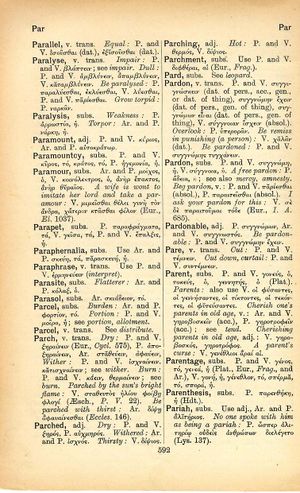paralysis
μήτε δίκην δικάσῃς πρίν ἀμφοῖν μῦθον ἀκούσῃς → do not give your judgement until you have heard a speech on both sides
English > Greek (Woodhouse)
subs.
Weakness: P. ἀρρωστία, ἡ. Torpor: Ar. and P. νάρκη, ἡ.
Latin > English (Lewis & Short)
părălysis: is, f., = παράλυσις,
I palsy, paralysis: paralysi mederi, Plin. 20, 3, 8, § 14: paralysi periclitari, id. 20, 15, 59, § 165: adulescens, paralysin cave, Petr. 120; Vulg. 1 Macc. 9, 55.
Latin > French (Gaffiot 2016)
părălўsis, is, f. (παράλυσις),
1 paralysie d’un côté du corps : Plin. 20, 14 ; 20, 165
2 [chez les haruspices] explication : Fulg. Myth. 3, 10.
Latin > German (Georges)
paralysis, is u. eos, Akk. in, Abl. i, f. (παράλυσις), I) als mediz. t. t., die Lähmung der Nerven an einer Seite des Körpers, die Paralyse, der Schlagfluß, rein lat. nervorum resolutio od. remissio, Plin. u.a. – II) als t. t. der Haruspizin, die Auflösung, Erklärung, Fulg. myth. 3, 10.

